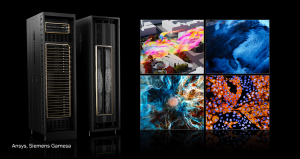NVIDIA today at SC24 announced two new NVIDIA NIM microservices that can accelerate climate change modeling simulation results by 500x in NVIDIA Earth-2.
Earth-2 is a digital twin platform for simulating and visualizing weather and climate conditions. The new NIM microservices offer climate technology application providers advanced generative AI-driven capabilities to assist in forecasting extreme weather events.
NVIDIA NIM microservices help accelerate the deployment of foundation models while keeping data secure.
Extreme weather incidents are increasing in frequency, raising concerns over disaster safety and preparedness, and possible financial impacts.
Natural disasters were responsible for roughly $62 billion of insured losses during the first half of this year. That’s about 70% more than the 10-year average, according to a report in Bloomberg.
NVIDIA is releasing the CorrDiff NIM and FourCastNet NIM microservices to help weather technology companies more quickly develop higher-resolution and more accurate predictions. The NIM microservices also deliver leading energy efficiency compared with traditional systems.
New CorrDiff NIM Microservices for Higher-Resolution Modeling
NVIDIA CorrDiff is a generative AI model for kilometer-scale super resolution. Its capability to super-resolve typhoons over Taiwan was recently shown at GTC 2024. CorrDiff was trained on the Weather Research and Forecasting (WRF) model’s numerical simulations to generate weather patterns at 12x higher resolution.
High-resolution forecasts capable of visualizing within the fewest kilometers are essential to meteorologists and industries. The insurance and reinsurance industries rely on detailed weather data for assessing risk profiles. But achieving this level of detail using traditional numerical weather prediction models like WRF or High-Resolution Rapid Refresh is often too costly and time-consuming to be practical.
The CorrDiff NIM microservice is 500x faster and 10,000x more energy-efficient than traditional high-resolution numerical weather prediction using CPUs. Also, CorrDiff is now operating at 300x larger scale. It is super-resolving — or increasing the resolution of lower-resolution images or videos — for the entire United States and predicting precipitation events, including snow, ice and hail, with visibility in the kilometers.
Enabling Large Sets of Forecasts With New FourCastNet NIM Microservice
Not every use case requires high-resolution forecasts. Some applications benefit more from larger sets of forecasts at coarser resolution.
State-of-the-art numerical models like IFS and GFS are limited to 50 and 20 sets of forecasts, respectively, due to computational constraints.
The FourCastNet NIM microservice, available today, offers global, medium-range coarse forecasts. By using the initial assimilated state from operational weather centers such as European Centre for Medium-Range Weather Forecasts or National Oceanic and Atmospheric Administration, providers can generate forecasts for the next two weeks, 5,000x faster than traditional numerical weather models.
This opens new opportunities for climate tech providers to estimate risks related to extreme weather at a different scale, enabling them to predict the likelihood of low-probability events that current computational pipelines overlook.
Learn more about CorrDiff and FourCastNet NIM microservices on ai.nvidia.com.









